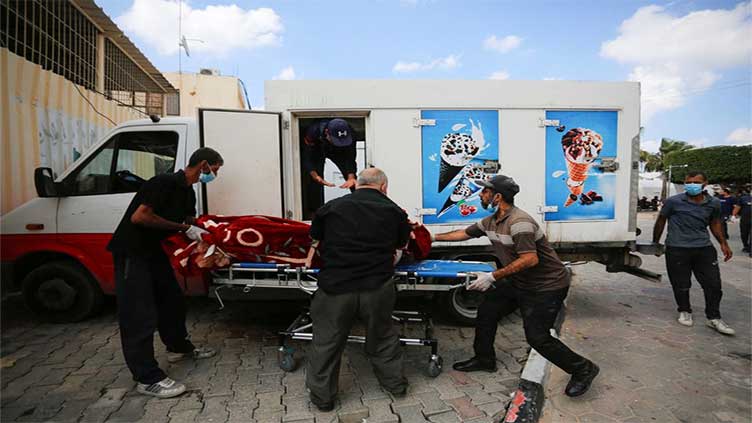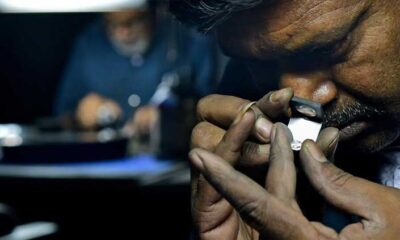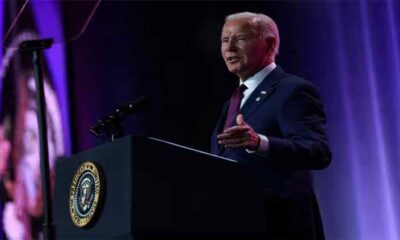“Stop the bombs and save lives!” the Palestinian ambassador pleaded at an emotional U.N. meeting Thursday on the war in Gaza. But Israel’s envoy was adamant, declaring again, “We will not rest until Hamas is obliterated.”
The war sparked by Gaza’s Hamas rulers’ surprise attacks on Israel on Oct. 7 played out in the vast hall of the 193-nation General Assembly, where Arab nations expected to adopt a resolution Friday calling for an immediate cease-fire in Gaza after the Security Council’s four failed attempts to agree on any action.
At the assembly’s resumed emergency special session on Israeli actions in the Palestinian territories Thursday, speaker after speaker backed the Arab resolution’s cease-fire call — except for Israel’s U.N. Ambassador Gilad Erdan, who told the 193-member world body, “A cease-fire means giving Hamas time to rearm itself, so they can massacre us again.”
After quoting several Hamas statements vowing to destroy Israel and the Jews, he said, “Any call for a cease-fire is not an attempt at peace. It is an attempt to tie Israel’s hands, preventing us from eliminating a huge threat to our citizens.”
On another key issue — the more than 220 hostages taken from Israel — Iran’s foreign minister said Hamas is ready to release civilian prisoners, and he said the international community must take responsibility for releasing 6,000 Palestinian prisoners held in Israel.
Iran “stands ready to play its part in this very important humanitarian endeavor, along with Qatar and Turkey,” Hossein Amirabdollahian told the assembly.
Iran is a key backer of Hamas and Qatar has already played a key role in the release of four Israeli civilians.
Israel’s Erdan said the country’s action has nothing to do with the Arab-Israeli conflict or the Palestinian question. This is not a war with the Palestinians. Israel is at war with the genocidal Jihadist Hamas terror organization,” he said.
But Riyad Mansour, the Palestinian U.N. ambassador, said 70% of those killed in Gaza were children and women. “Is this the war some of you are defending? Can this war be defended? These are crimes. This is barbarism,” he said.
“If you do not stop it for all those who were killed, stop it for all those whose lives we can still save,” he said.
The anguish over the deaths on both sides was palpable.
Mansour’s voice cracked when he spoke of a Palestinian girl killed before the birthday her father had planned and a man hugging the body of his dead mother and saying: “Come back, and I will take you wherever you want.”
Erdan’s voice rose when he told the assembly of Hamas fighters firing blindly at hundreds of young people at a concert in southern Israel, parading naked girls that they had raped, and crushing the skulls of babies. He showed a brief video of a badly injured agricultural worker from Thailand being decapitated “with a blunt gardening tool.”
Jordan’s Foreign Minister Ayman Safadi, speaking on behalf of the 22-nation Arab Group, spoke emotionally of children dying under the rubble of homes destroyed by Israeli precision bombs, and some still alive and trapped with no equipment to pull them out. “The parents can still hear them. They talk to them helplessly, knowing that they are running out of air and are slowly dying,” he said.
In a sharp rebuke to the Israeli ambassador, he told the assembly, “I don’t have videos to show you. We respect the dead too much. We respect the pain of their families too much to show videos.”
Safadi also criticized Erdan for not saying a word “about Palestinian lives shattered in this war.”
“Don’t let them tell you this is a war between Muslims and Jews,” he said. “We value life, Muslim life, Christian life, Jewish life.” He was interrupted with applause when he then said, “We care about all lives. … Don’t let them tell you otherwise.”
The Jordanian minister also told Israel that it cannot remain above international law requiring protection of civilians, hospitals, schools, homes and other infrastructure.
“The right to self-defense is not a license to kill with impunity,” he stressed.
Safadi also criticized the United States and its allies without naming them.
“Many among us believe that they are helping Israel by supporting its war,” he said. “They are not. Instead of sending weapons to Israel, send delegations to open an immediate and viable path to peace. This is how they can help Israel.”
Iran’s Amirabdollahian accused the United States of directly participating in the war and what he called a “genocide” against the Palestinians. “The genocide in Gaza must stop immediately,” he said.
Post Views: 42


 Fashion3 months ago
Fashion3 months ago
 World3 months ago
World3 months ago
 World3 months ago
World3 months ago
 Sports2 months ago
Sports2 months ago
 Sports2 months ago
Sports2 months ago
 World3 months ago
World3 months ago
 Tech3 months ago
Tech3 months ago
 Business2 months ago
Business2 months ago



















